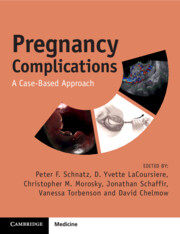Book contents
- Pregnancy Complications
- Pregnancy Complications
- Copyright page
- Contents
- Contributors
- Preface
- Note from the Editor-in-Chief
- Normal Laboratory Values (Conventional Units) []
- Section 1 Antepartum (Early Pregnancy)
- Section 2 Antepartum (Mid-trimester)
- Section 3 Antepartum (Late Pregnancy)
- Section 4 Antepartum (Medical Complications)
- Case 32 A 35-Year-Old Presents at 25 Weeks’ Gestation with Abnormal Glucose Tolerance Testing
- Case 33 A 25-Year-Old Presents at 35 Weeks’ Gestation with Hypertension, Proteinuria, and Seizure
- Case 34 A 25-Year-Old at 32 Weeks’ Gestation with Hypertension and Right Upper Quadrant Pain
- Case 35 A 35-Year-Old Presents at 8 Weeks’ Gestation with Tremor and Exophthalmos
- Case 36 A 23-Year-Old Primigravida at 8 Weeks’ Gestation with Fatigue, Constipation, and Cold Intolerance
- Case 37 A 25-Year-Old with Elevated Hemoglobin A2 on Initial Prenatal Labs
- Case 38 A 30-Year-Old at 10 Weeks’ Gestation with a New Positive HIV Test
- Section 5 Antepartum (Infectious Complications)
- Section 6 Intrapartum/Delivery
- Section 7 Postpartum
- Section 8 Fetal Complications
- Section 9 Placental Complications
- Section 10 Complications of the Cord, Amnion, and Gravid Uterus
- Section 11 Psychosocial Considerations
- Index
- References
Case 37 - A 25-Year-Old with Elevated Hemoglobin A2 on Initial Prenatal Labs
from Section 4 - Antepartum (Medical Complications)
Published online by Cambridge University Press: 08 April 2025
- Pregnancy Complications
- Pregnancy Complications
- Copyright page
- Contents
- Contributors
- Preface
- Note from the Editor-in-Chief
- Normal Laboratory Values (Conventional Units) []
- Section 1 Antepartum (Early Pregnancy)
- Section 2 Antepartum (Mid-trimester)
- Section 3 Antepartum (Late Pregnancy)
- Section 4 Antepartum (Medical Complications)
- Case 32 A 35-Year-Old Presents at 25 Weeks’ Gestation with Abnormal Glucose Tolerance Testing
- Case 33 A 25-Year-Old Presents at 35 Weeks’ Gestation with Hypertension, Proteinuria, and Seizure
- Case 34 A 25-Year-Old at 32 Weeks’ Gestation with Hypertension and Right Upper Quadrant Pain
- Case 35 A 35-Year-Old Presents at 8 Weeks’ Gestation with Tremor and Exophthalmos
- Case 36 A 23-Year-Old Primigravida at 8 Weeks’ Gestation with Fatigue, Constipation, and Cold Intolerance
- Case 37 A 25-Year-Old with Elevated Hemoglobin A2 on Initial Prenatal Labs
- Case 38 A 30-Year-Old at 10 Weeks’ Gestation with a New Positive HIV Test
- Section 5 Antepartum (Infectious Complications)
- Section 6 Intrapartum/Delivery
- Section 7 Postpartum
- Section 8 Fetal Complications
- Section 9 Placental Complications
- Section 10 Complications of the Cord, Amnion, and Gravid Uterus
- Section 11 Psychosocial Considerations
- Index
- References
Summary
Hemoglobinopathies are vast grouping of inherited disorders of the hemoglobin chain genes that affect over 270 million people globally. The most common hemoglobinopathies include sickle cell, alpha- thalassemia, and beta-thalassemia. Each of these diseases has numerous phenotypes and thus presentation and management of each will vary. Generally, the carrier or asymptomatic states have pregnancy outcomes that mirror the general population. Patients with clinically significant disease are at increased risk for numerous maternal and fetal complications. All patients desiring pregnancy and those that are currently pregnant should be screened for hemoglobinopathy and those found to have one provided with genetic counseling regarding any potential maternal or fetal risks.
Keywords
- Type
- Chapter
- Information
- Pregnancy ComplicationsA Case-Based Approach, pp. 112 - 114Publisher: Cambridge University PressPrint publication year: 2025

